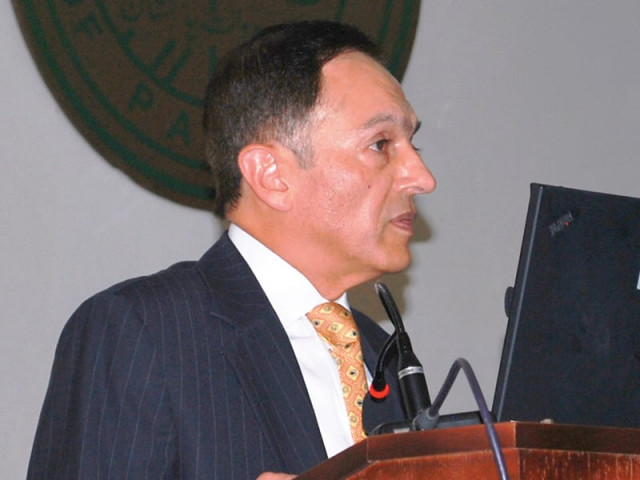State Bank of Pakistan: Yaseen Anwar appointed as governor
Experts viewing the appointment as a successful attempt to whitewash financial affairs of the present government.

State Bank of Pakistan: Yaseen Anwar appointed as governor
Three names were considered for the post including Anwar, Ali Raza and Dr Shamshad Akhtar.
The government was required to appoint a new governor before October 18 as Anwar’s tenure as interim head of the body ended yesterday.
The post had been vacant since Shahid Hafeez Kardar resigned from the post on July 18.
Updated from the print story (below)
Acting governor poised to take over as chief
In the race to the top at the central bank, the insider appears to have won.
The federal government has decided to appoint a dual nationality holder, Yaseen Anwar, as State Bank governor, informed sources told The Express Tribune.
Currently serving as the acting governor of the SBP, Anwar has beaten two other contenders, National Bank of Pakistan chairman Ali Raza and former SBP governor Shamshad Akhtar, and would shortly be notified the 17th governor of the central bank, and the fourth governor in three-and-a-half years of the incumbent government.
News of Anwar’s prospective appointment elicited a mixed reaction, with some experts viewing it as a successful attempt to whitewash financial affairs of the present government. As acting governor since July 18, Anwar has reduced the key interest rate by 2% – a move widely interpreted as an attempt to appease industrialists as general elections approach.
Anwar would succeed Shahid Hafiz Kardar, who resigned on July 15 after developing “serious policy differences” with the federal government.
(Read: Resignation of SBP governor)
Anwar is a US citizen and is a graduate of the Wharton business school at the University of Pennsylvania. He was appointed deputy governor of SBP in 2007 and has 33 years of international banking experience. Prior to his appointment at the SBP, Anwar was associated with Kraken Financial Group, London as its executive vice-president since 2003.
“Yaseen Anwar is professionally pretty good and as deputy governor has done some good job,” said former finance minister Shaukat Tarin.
While some appreciate his professional attributes, others, including those who have worked closely with him, are sceptic, fearing that the central bank would further lose its autonomy to the finance ministry.
“Anwar is a typical banker,” said Dr Ashfaque Hasan Khan, a renowned economist. “If appointed, he may not meaningfully contribute in economic policy making and the institution of the SBP would further weaken, and could easily be used for political purposes.”
Anwar’s colleagues add that he is reserved, and is not an avid contributor at meetings. They quote a recent meeting with the International Monetary Fund in Washington where he was unable to present the country’s case.
‘Weak’ governor
Many viewed SBP’s latest decision to cut the policy rate by 1.5% in one go as an evidence of leverage the federal government would enjoy over a “weak governor.” Earlier, under Anwar, the central bank had reduced the discount rate by 0.5%.
(Read: Explaining the rate cut – A case of contrasting styles)
“A 1.5% cut in policy rate was too big a decision”, said Dr Hafiz Pasha, the former finance minister who served on the Monetary Policy Committee of the SBP until May. The committee has, since then, ceased to exist, closing the only window available to macroeconomists to participate in monetary policy formulation.
After the parliament’s refusal to provide a legal base to the Monetary Committee, the bank’s Central Board of Directors has been revived, dominated by the government and comprising businessmen who are dwarfed by the federal finance secretary.
None of the Board’s private members at present are credible macroeconomists, a demand reiterated by independent experts.
(Read: A gamble with the economy)
Sources fear that Anwar could be used by the presidency to whitewash its financial profligacy. For the past several months, the federal government has successfully blocked a move to discuss the accounts of the National Bank of Pakistan. According to unconfirmed reports, the NBP extended billions of rupees worth of loans on substandard collaterals, on political grounds, and the central bank failed to play its regulatory role.
Published in The Express Tribune, October 19th, 2011.


















COMMENTS
Comments are moderated and generally will be posted if they are on-topic and not abusive.
For more information, please see our Comments FAQ